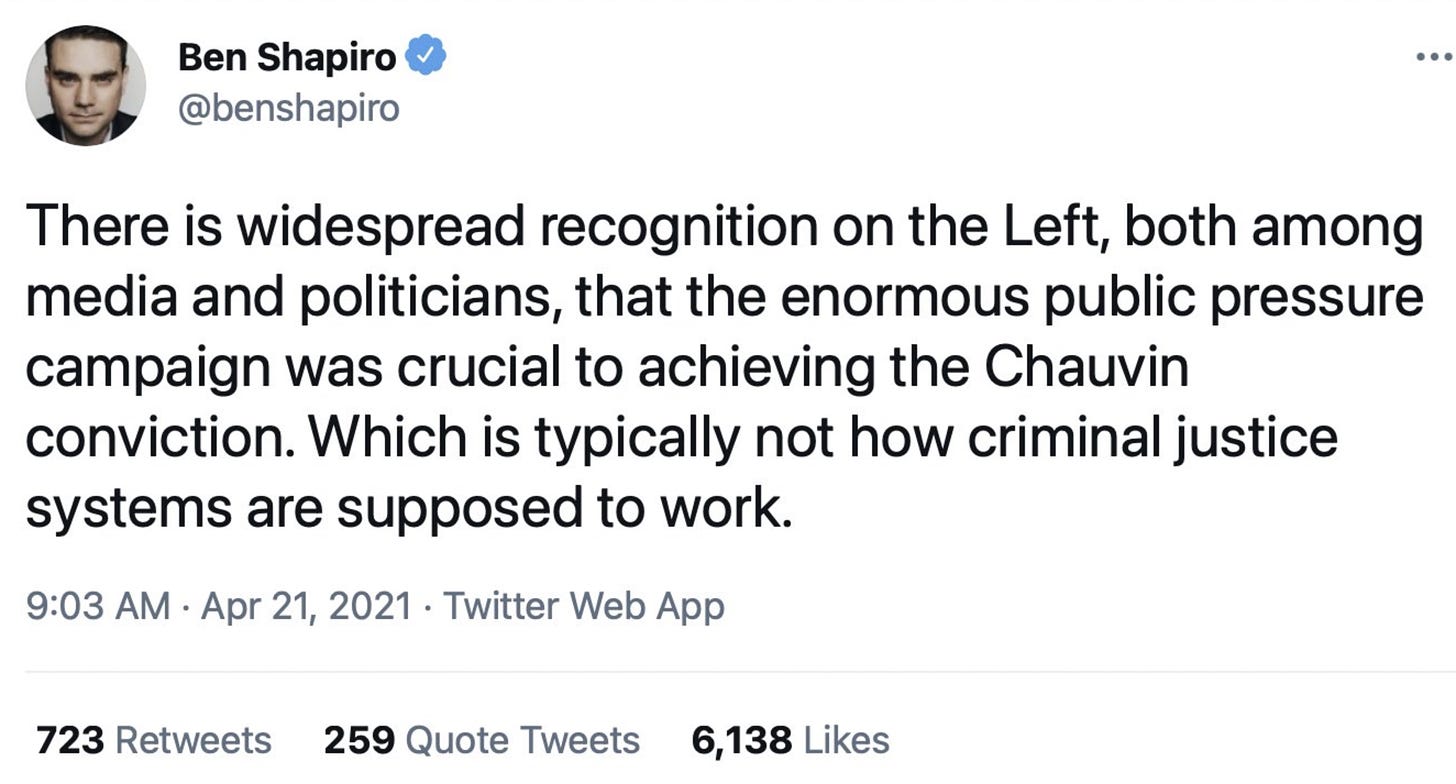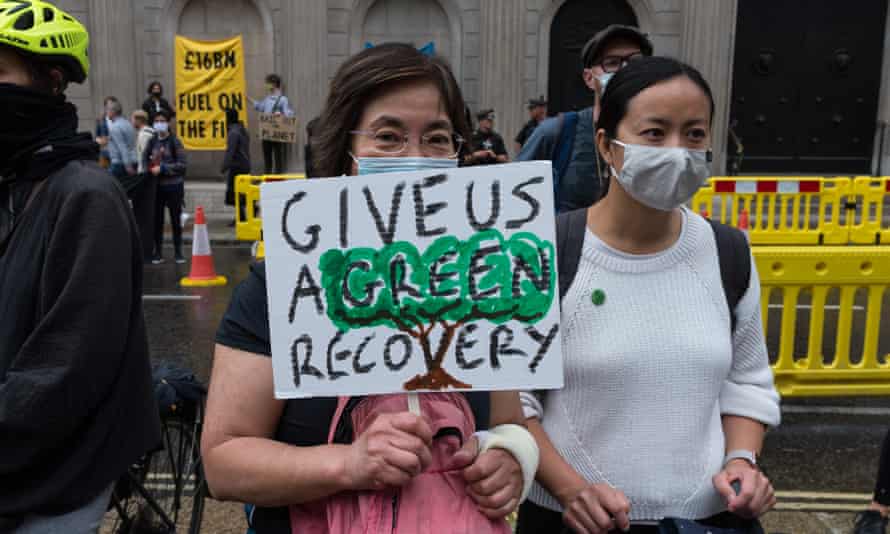Russian President Vladimir Putin denounced Western silence on the “coup d’etat attempt in Belarus.” He stated this during his annual address to the Federal Assembly in Moscow on Wednesday, 21 April.

Photo: press service of the President of Russia
Putin stressed that Russia intends to defend its own interests within the framework of international law, as other countries do.
“In the world, unfortunately, it seems that everyone is used to the practice of politically motivated, illegal sanctions in the economy. These are rough attempts to impose their own will on others by force. Today, this practice is growing into something much more dangerous. I mean the recently known direct attempt to organize a coup d’etat in Belarus and the assassination of the president of this country,” he said.
At the same time, it is characteristic, Putin continued, that even such flagrant actions do not find condemnation of the so-called collective West.
“Nobody seems to notice this. Everyone pretends that nothing is happening at all. You can think whatever you want about Ukrainian President Yanukovych, who was also almost killed and removed from power in an armed coup, or Maduro in Venezuela … You can have any point of view regarding the policy of Belarusian President Lukashenko. But the practice of organizing a coup d’etat, plans for political assassinations, including those of high-ranking officials, are too much! All lines have been crossed!”
In fact, it was a massive cyberattack, Putin said. “And all those confessions of the detained conspirators, that they planned to block Minsk, including the city infrastructure, a complete shutdown of the capital’s energy system. […] What would have happened if the coup d’etat attempt had been actually undertaken? How many people would have suffered? What would have happened to Belarus if such a coup took place, no one cares, as no one thought about Ukraine when the coup was carried out in this country.”
At the same time, Vladimir Putin emphasized the peacefulness of the Russian authorities, despite the unfriendly actions against it.
“In some countries, a nasty custom has been introduced: for any reason, and most often for no reason at all, to criticize Russia. In the sports sphere. In this regard, we behave in an extremely restrained manner, I will say directly without irony, modestly, we often do not respond at all not only to unfriendly actions but also to outright rudeness,” he said.
The Russian President assured that he did not want to burn the bridges and wants to have friendly relations with the world community
“But if some interpret our good intentions as indifference or weakness and intend to burn or blow up bridges himself, they should know: Russia’s response will be asymmetrical, rapid and harsh. The organizers of any provocations that threaten the fundamental interests of our security will regret their deeds like never before!”
Read also:
Russian Prime Minister Comes To Minsk, Lukashenko Announces Meeting With Putin
Peskov: Putin And Biden Discussed Information About Assassination Attempt On Lukashenko
Coup plot
On Saturday, 17 April, Alexander Lukashenko said that political analyst Alexander Feduta and lawyer Yury Zenkovich were involved in plotting the assassination attempt on him and his sons. “Then we found out about the involvement of foreign intelligence services. Most likely, the CIA, the FBI, I do not know which of the Americans exactly. We learned about their plans to come to Minsk and to organize an assassination against the president and his children,” said Lukashenko.
Later that day, the state-run ONT TV channel aired a report with a commentary by the KGB Chairperson Ivan Tertel that the special services “managed to prevent attempts of an armed coup in Belarus and elimination of government officials”. The official said that Alexander Feduta, Yuri Zenkovich and Grigory Kostusev were members of the criminal group. The ONT reported that “the conspirators plotted the coup for the summer of this year, June or July”.
The Federal Security Service (FSS) of Russia confirmed the information of the KGB of Belarus and stated that it had participated in the operation to detain Feduta and Zenkovich in Moscow. According to the agency, they arrived in the city after consultations in the U.S. and Poland to meet with “opposition-minded generals of the Belarusian Armed Forces.” At the same time, according to the FSS, seizing power by force in Belarus was planned for 9 May.
“Any suggestion that the U.S. government was behind this or was involved in the attempted assassination of Lukashenko is completely false,” said the U.S. State Department representative.
Source: TUT.BY
European dictator is a close ally of Russia's Putin
White House press secretary Jen Psaki on Wednesday denied that the United States was involved in an alleged plot to assassinate contested Belarusian President Alexander Lukashenko.
"I can confirm there's no basis in fact there," Psaki said when asked about the allegation.
The Russian military intelligence agency FSB said late last week that it arrested two men, including one with a dual citizenship in the United States and Belarus, who planned a military coup in Belarus and to assassinate Lukashenko.

White House press secretary Jen Psaki speaks during a press briefing at the White House in Washington, Monday, April 19, 2021. (AP Photo/Andrew Harnik)
RUSSIA'S PUTIN, BELARUS' LUKASHENKO SPARK BACKLASH FOR SKIING, RIDING SNOWMOBILES DURING MASS PROTESTS
Lukashenko later alleged that the U.S. was behind the alleged plot. He said he was "surprised" that "the Americans behave this way" and that "no one can set the task of eliminating the president, except the top political leadership," according to his office's website.
Russia's President Vladimir Putin on Wednesday lamented the fact Western officials had not addressed the alleged plot against Lukashenko.
"It is typical that even such flagrant actions have not been condemned by the so-called collective West. Nobody seemed to notice. Everyone pretends nothing is happening," Putin said. "[T]he practice of staging coups d’état and planning political assassinations, including those of high-ranking officials — well, this goes too far. This is beyond any limits."
Psaki also responded to more general broadsides that Putin launched against Western countries in her press briefing Wednesday.
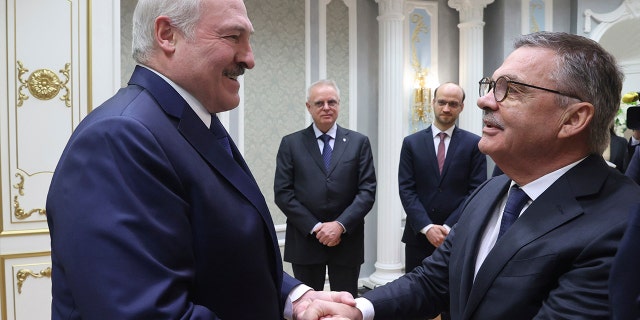
Belarusian President Alexander Lukashenko, left, greets International Ice Hockey Federation President Rene Fasel during their meeting in Minsk, Belarus, Monday, Jan. 11, 2021. White House Press Secretary Jen Psaki denied Lukashenko's allegation that the U.S. was behind a plot to assassinate him. (Nikolai Petrov/BelTA Pool Photo via AP)
BELARUS OLYMPIC BODY ELECTS LUKASHENKO'S SON AS LEADER
"I don't think we take anything President Putin says personally. We have tough skin," she said.
The United States officially categorizes Belarus, an ally of Russia, as an authoritarian country. The U.S. does not recognize the result of the 2020 presidential election. Secretary of State Anthony Blinken called it "fraudulent."
"As a result of government suppression surrounding the fraudulent August 2020 Presidential elections in Belarus and its aftermath, there are more than 340 political prisoners detained in Belarus today," Blinken said in a statement Monday. "The United States calls on the Belarusian authorities to immediately and unconditionally release all those unjustly detained or imprisoned."
On Tuesday, U.S. Ambassador to Belarus Julie Fisher met with Belarus opposition leader Sviatlana Tsikhanouskaya in Lithuania. Tsikhanouskaya is in self-imposed exile in the neighboring country, according to Reuters.
"It is important that the international community speak up and speak out about what’s happening, that we pay close attention, and that we call for the immediate release of all political prisoners in Belarus," Fisher said, according to Reuters
UkraineAlert by Brian Whitmore
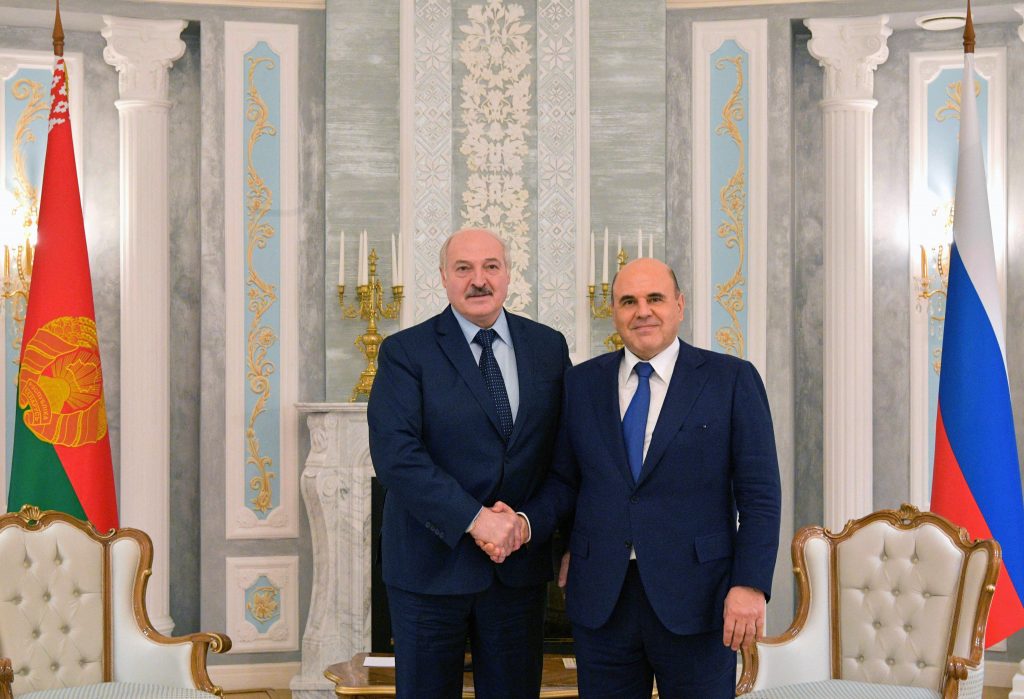
Belarus President Alyaksandr Lukashenka and Russian Prime Minister Mikhail Mishustin meet in Minsk on April 16. (Alexander Astafyev/POOL/TASS via REUTERS)
One way to look at Belarus ruler Alyaksandr Lukashenka’s claim last week that he was the target of a US-backed coup and assassination attempt is that this is just the latest in a series of conspiratorial rants by an increasingly beleaguered dictator.
But as is often the case in the former Soviet Union, upon closer examination, there appears to be at least some method behind all the madness.
Lukashenka’s claim that the plot was approved “by the top political leadership” in the United States came just days after Russia’s Federal Security Service had arrested two Belarusians, including one with US citizenship, and accused them of plotting to carry out a coup during the May 9 Victory Day parade in Minsk.
Yuras Zyankovich, a Belarusian-born lawyer who also holds US citizenship, and Alyaksandr Fyaduta, who served as Lukashenka’s spokesman in the 1990s, were extradited to Belarus.
The Belarusian KGB said the alleged plot was connected to an online discussion on Zoom last summer among experts, opposition figures, and former law enforcement officials who were discussing the country’s political situation and possible future scenarios.
The immediate context surrounding the arrests and coup plot allegations suggests that these developments are part of a broader operation designed to advance Russia’s strategic goals both in Belarus and vis-a-vis the West.
News of the “coup plot” came as Lukashenka prepares to visit Moscow for talks with Kremlin leader Vladimir Putin on April 22. On the eve of Lukashenka’s visit, Putin raised the alleged plot in his bellicose state-of-the-nation speech on April 21, claiming that what he called “unjust sanctions” against Belarus are escalating into “something more dangerous: a coup attempt in Belarus.”
As speculation mounted over the coming meeting in Moscow, Lukashenka released an oblique statement on the state-run Telegram channel Pul Pervovo on April 17 announcing that he has made “the most principled decision of my quarter-of-a-century presidency,” adding that “it will be serious” and he will “formalize” the decision soon. This has led to speculation that some form of deeper integration between Russia and Belarus could be imminent.
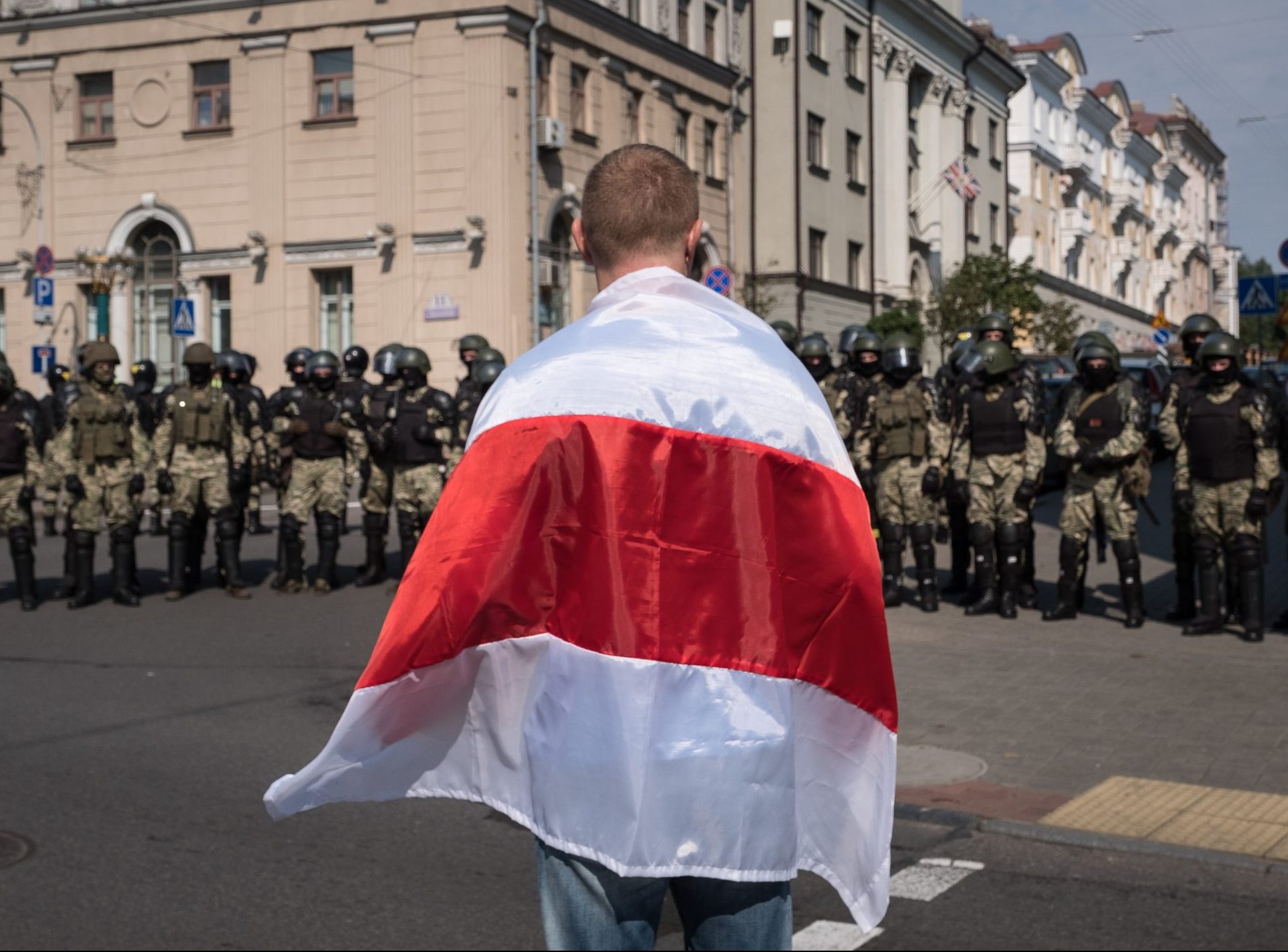
The broader context surrounding the recent arrests and coup allegations is also important. The “exposure” of the alleged plot comes at a time when Russia is visibly expanding its political, economic, and military footprint in Belarus with the clear aim of achieving Moscow’s long-standing objective of turning its smaller but strategically vital
One way to look at Belarus ruler Alyaksandr Lukashenka’s claim last week that he was the target of a US-backed coup and assassination attempt is that this is just the latest in a series of conspiratorial rants by an increasingly beleaguered dictator.
But as is often the case in the former Soviet Union, upon closer examination, there appears to be at least some method behind all the madness.
Lukashenka’s claim that the plot was approved “by the top political leadership” in the United States came just days after Russia’s Federal Security Service had arrested two Belarusians, including one with US citizenship, and accused them of plotting to carry out a coup during the May 9 Victory Day parade in Minsk.
Yuras Zyankovich, a Belarusian-born lawyer who also holds US citizenship, and Alyaksandr Fyaduta, who served as Lukashenka’s spokesman in the 1990s, were extradited to Belarus.
The Belarusian KGB said the alleged plot was connected to an online discussion on Zoom last summer among experts, opposition figures, and former law enforcement officials who were discussing the country’s political situation and possible future scenarios
The immediate context surrounding the arrests and coup plot allegations suggests that these developments are part of a broader operation designed to advance Russia’s strategic goals both in Belarus and vis-a-vis the West.
News of the “coup plot” came as Lukashenka prepares to visit Moscow for talks with Kremlin leader Vladimir Putin on April 22. On the eve of Lukashenka’s visit, Putin raised the alleged plot in his bellicose state-of-the-nation speech on April 21, claiming that what he called “unjust sanctions” against Belarus are escalating into “something more dangerous: a coup attempt in Belarus.”
As speculation mounted over the coming meeting in Moscow, Lukashenka released an oblique statement on the state-run Telegram channel Pul Pervovo on April 17 announcing that he has made “the most principled decision of my quarter-of-a-century presidency,” adding that “it will be serious” and he will “formalize” the decision soon. This has led to speculation that some form of deeper integration between Russia and Belarus could be imminent.
The broader context surrounding the recent arrests and coup allegations is also important. The “exposure” of the alleged plot comes at a time when Russia is visibly expanding its political, economic, and military footprint in Belarus with the clear aim of achieving Moscow’s long-standing objective of turning its smaller but strategically vital Western neighbor into a pliant and obedient vassal. It also comes when Belarusian society is increasingly distancing itself from Russia and embracing the West amid an unprecedented wave of pro-democracy protests.
At the most basic level, claims of a US-backed coup advance Moscow’s goal of increasing Belarusian isolation from the West and increasing its dependence on Russia. It also appears to be an attempt to foreclose any attempt by Lukashenka to return to his pre-August 2020 game of tacking between Moscow and the West in order to achieve the maximum degree of geopolitical flexibility.
The main objective here may have been to send a clear and unambiguous message to the Belarusian strongman: you are in Russia’s sphere of influence now and you have no place else to turn. Judging from his subsequent comments, Lukashenka appears to have received the message loud and clear.
In his public statements, Lukashenka has not only accepted Russia’s narrative about the arrests and the plot, but has also built on them enthusiastically. According to his evidence-free account, not only was there a US-backed plot to overthrow the Belarusian government, but also a conspiracy to assassinate him and his children.
Lukashenka has claimed that Putin raised the issue of the alleged US-backed plot in a recent phone call with US President Joe Biden. “I am grateful to Putin. When he was talking with Biden, he asked him this question,” Lukashenka reportedly commented. Kremlin spokesman Dmitry Peskov later confirmed Lukashenka’s account.
In addition to advancing Moscow’s geopolitical goals in Belarus, this “coup plot” also feeds into Moscow’s perennial goal of establishing a “whataboutism” narrative with the West at a time when Russia is under increasing scrutiny for massing troops on the Ukrainian border. It also follows news of new US sanctions over the SolarWinds hack against US federal agencies and interference in the 2020 US election. And it comes in the midst of an escalating diplomatic crisis with the Czech Republic, which expelled Russian diplomats last week over claims that Russian military agents were behind a deadly 2014 explosion at a Czech arms depot.
Despite US denials and a lack of any real evidence to support it, the alleged coup plot gives Moscow the ability to advance a narrative that it is not guilty of anything more nefarious than the West’s own actions. Indeed, Russian Foreign Ministry Spokeswoman Maria Zakharova claimed that the recent Czech decision to expel Russian diplomats was an effort by the West to distract attention from the alleged coup plot.
The Belarusian “coup plot” comes right out of the Kremlin playbook of using dramaturgy, subterfuge, and disinformation to muddy the waters, establish false equivalency narratives, and create facts on the ground to advance Moscow’s imperial and revanchist geopolitical goals. It is important for Western policymakers to remain clear-eyed amidst all this Kremlin-generated fog.
The essence of the conflict between Russia and the West is a normative struggle between a Western system based on the rule of law and accountability against an alternative advanced by the Putin regime that is based on kleptocracy and autocracy. It is a battle being played out in Russia’s neighboring countries, including Belarus, and inside Russia itself.
The West is on the right side of history in this struggle and must not allow itself to be distracted from this essential truth by the Kremlin’s dramaturgy and subterfuge.
In his public statements, Lukashenka has not only accepted Russia’s narrative about the arrests and the plot, but has also built on them enthusiastically. According to his evidence-free account, not only was there a US-backed plot to overthrow the Belarusian government, but also a conspiracy to assassinate him and his children.
Lukashenka has claimed that Putin raised the issue of the alleged US-backed plot in a recent phone call with US President Joe Biden. “I am grateful to Putin. When he was talking with Biden, he asked him this question,” Lukashenka reportedly commented. Kremlin spokesman Dmitry Peskov later confirmed Lukashenka’s accoun
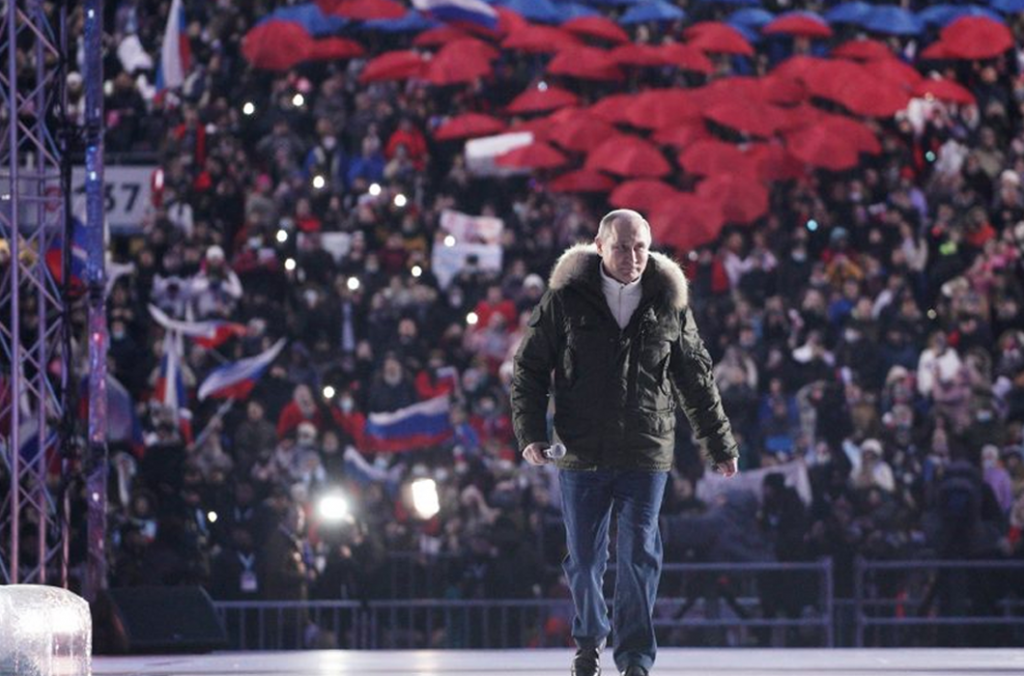
In addition to advancing Moscow’s geopolitical goals in Belarus, this “coup plot” also feeds into Moscow’s perennial goal of establishing a “whataboutism” narrative with the West at a time when Russia is under increasing scrutiny for massing troops on the Ukrainian border. It also follows news of new US sanctions over the SolarWinds hack against US federal agencies and interference in the 2020 US election. And it comes in the midst of an escalating diplomatic crisis with the Czech Republic, which expelled Russian diplomats last week over claims that Russian military agents were behind a deadly 2014 explosion at a Czech arms depot.
Despite US denials and a lack of any real evidence to support it, the alleged coup plot gives Moscow the ability to advance a narrative that it is not guilty of anything more nefarious than the West’s own actions. Indeed, Russian Foreign Ministry Spokeswoman Maria Zakharova claimed that the recent Czech decision to expel Russian diplomats was an effort by the West to distract attention from the alleged coup plot.
The Belarusian “coup plot” comes right out of the Kremlin playbook of using dramaturgy, subterfuge, and disinformation to muddy the waters, establish false equivalency narratives, and create facts on the ground to advance Moscow’s imperial and revanchist geopolitical goals. It is important for Western policymakers to remain clear-eyed amidst all this Kremlin-generated fog.
The essence of the conflict between Russia and the West is a normative struggle between a Western system based on the rule of law and accountability against an alternative advanced by the Putin regime that is based on kleptocracy and autocracy. It is a battle being played out in Russia’s neighboring countries, including Belarus, and inside Russia itself.
The West is on the right side of history in this struggle and must not allow itself to be distracted from this essential truth by the Kremlin’s dramaturgy and subterfuge.
Brian Whitmore is a Nonresident Senior Fellow at The Atlantic Council’s Eurasia Center, an Adjunct Assistant Professor at The University of Texas at Arlington, and host of The Power Vertical Podcast.


